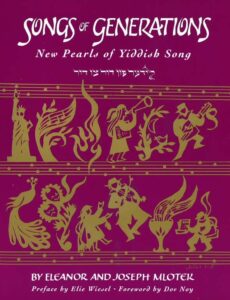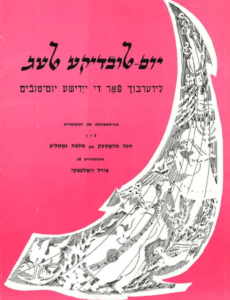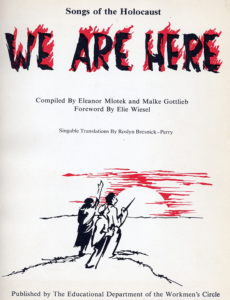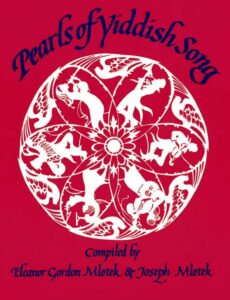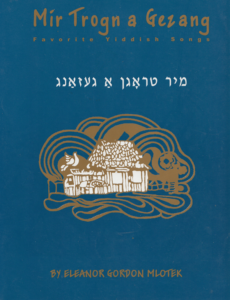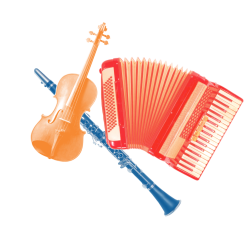Discover the Music
Browse through each song book or search the entire collection.
Search
Di Krenetse
Di Lena
Part of a poem about an exiled political prisoner in Siberia. Words by Abraham Liessin (1872-1938), music is based on a folk melody. The poem originally entitled “Oyfn vaytn tsofn” (In the Far North) was printed by Minsk in 1896.
Di Mame Dertseylt
Words by Jacob Adler (1873-1973), also known by his pen name B. Kovner. Originally entitled “Di bobe dertseylt” (Grandmother tells a story), the poem appeared in Adler’s book Lider (New York, 1924). The song was sung by Yosl Mlotek in Warsaw in the 1930’s.
The text has always been published anonymously: in 1927 In 100 naye folkslider; in 1966 with a different melody by Lin Jaldati and Eberhard Rebling; and in 1984 with the same melody by Bina Steinberg.
Identifying the source of this song was the original impetus in 1970 for initiating our weekly, later bi-weekly, column, “Pearts of Yiddish Poetry,” In the Jewish Forward.
Di Mashke
Di Mekhutonim Geyen
Text and melody by Mark Markovich Warshawsky (see note to Oyfn Pripetshik on page 2). Originally titled A Freylekhs (Khosns Tsad), the song pokes fun at the groom’s family: his sister spins like a top, one uncle is as haughty as a turkey, another is stout and forever patting his stomach.
Di Mizinke Oysgegebn
Text and music by Mark Markovich Warshawsky (see note to Oyfn Pripetshik on page 2). Originally titled Di Rod (Kales Tsad). The theme was used by Ernest Bloch in the Simchas Torah section of his Baal Shem Suite.
Di Sapozhkelekh
Folksong collected by Michael Alpert from the Russian emigre Bronya Sakina (born in Olvanisk, southern Ukraine) and popularized at the Klezkamp Folk Arts Program in 1985. Certain lines have parallels in other folksongs, like Oy, Abram: “lkh on dir un du on mir, / Vi a klyamke on a tir” (I without you and you without me are like a doorknob without a door); and Zog nor du sheyn meydele: “Abi mit dir in eynem zayn” (As long as I can be together with you). The song was sung by Eleanor Reissa in the Broadway show Those Were the Days. It was made popular by Adrienne Cooper and Joanne Borts.
Di Shvue
Text by Sh. Ansky (1863-1920), folklorist and author of the Dybbuk. The Shvue is the anthem of the Jewish Labor Bund, sung by Jewish workers and socialists in Europe and the United States.
Di Sokhe
This is part of a song written in 1888, by Elyokum Zunser (1836-1913), famous Badkhn (wedding entertainer). Di Sokhe is one of the first and most popular songs of Zion about pioneering in Israel. In Soviet Russia it was changed to extol, not the plow, but Stalin. “Our father Stalin gave us the best free life. I rise in the morning, don’t have to worry, don’t have to borrow.”
Di Svet-shap
Part of a song based on the poem “Di mashin” by the “poet of the sweatshop” Morris Rosenfeld (1862-1923). The song has two melodies, both of which are presented here. One was published in the collection of I. Glatstein, Di fraye muze, 1918. The second melody was sung to compilers by the late singer David Carrey (1942-1985). R. Pups writes that the poem was adapted in the Lodz Ghetto: “Es roysht azoy vild in resort di mashin” (The machine roars so wildly in the ghetto factory).
Di Tsukunft
Words by Morris Winchefsky (1856-1932), pen name of Lipe Bentsion Novochovitch. The song is sung in a recent play A sheyne meydl (A Pretty Girl), dealing with the Holocaust, which was presented at numerous colleges. At the end of a TV retrospective on the work of artist Yosl Bergner, he plays this melody on his harmonica.
Di Verbe
Hebrew poem by Khaim Nakhman Blallk (1873-1934), translated into Yiddish by I. Ma Yofis. Words and music published in 1937-1938 by Mikhl Gelbart.
Di Zun lz Fargangen
Di Zun Vet Aruntergeyn
Text by Moshe Leib Halpern (1886-1932), music by Ben Yomen (1901-1970).
Dire-Gelt
Folk song, published in 1912 by Y.L. Cahan. Paying rent and the threat of eviction were always problems, as this song testifies.
Don Un Donye
Words by H. Roisenblatt (1878-1956); music by Mikhl Gelbart (1889-1966). Published in composer’s collection Concert, 1933.
Dona Dona
Words by Aaron Zeitlin (1889-1973); music by Sholom Secunda (1894-1974). Published in sheet music by Metro Music Co., N.Y., 1943.
Originally entitled “Dana, dana, dana,” the song was written for Zeitlin’s play Esterke, produced by Maurice Schwartz in 1940-1, and printed in the program. It became one of the most widely sung Yiddish songs and was performed in Yiddish and English translation by Theodore Bikel, Joan Baez and others. Translations have also appeared in German and Korean.
In some collections, beginning with Ben Yomen’s (1946), the words are erroneously attributed to Yitskhok Katzenelson, Hebrew-Yiddish poet active in the Warsaw Ghetto underground. In a recent record produced in Germany, not only is the song attributed to Katzenelson, it is also interpreted as having been written in the Ghetto to express Jews’ longing for freedom.
Dos Alte Porfolk
Dos Baytshl Kreln
Words by Yitskhok Perlov (1911-1980); music by Lola Folman (d. 1979), well-known singer in pre-war Poland. The song was popularized in the United States by singer Mina Bern, who submitted it to us.
Dos Elnte Kid
This song written in the Vilno ghetto by the poet Shmerke Kaczerginski (see note about author in Friling) was dedicated to the child of a teacher, Rachel Pupko-Krinski. The child was hidden and raised by Gentiles. Composer YankI Krimski, an active participant in dramatic circles before the war, died in a German camp in Estonia.
Dos Fertsnte Yor
Part of a folk song, published in Der Jude in 1917. A soldier’s lament from the First World War.
Dos Freylekhe Khosidl
Words and music by Abraham Goldfaden (1840-1908). The words were published in Goldfaden’s first collection of Yiddish poems, Dos yidele, in 1866; the music was published by Chaim Kotylansky in 1944. This song was cited in the story of the founding of the Yiddish theater, When Goldfaden appeared in Jassy in the garden of Shimen Marks, in 1876, he recited his serious and very long poems Dos pintele yid and Der malekh. The audience, expecting lively entertainment and singing, grew increasingly bored and began to boo angrily. Goldfaden was rushed off the stage and one of the Broder Singers, Yisroel Grodner, quickly donned a robe, grabbed his wig of sidecurls and a Hassidic hat and jumped on the stage to sing “Dos freylekhe khosidl.” The audience soon recovered from their angry mood. Goldfaden notes in his autobiography that although he was disappointed by this “debacle,” it led him to the idea of creating a Yiddish theater to raise the level of taste and culture of Jewish audiences. Goldfaden’s song is partly derivative of the song “Dos khsidishe mizinke” (The Hassidic Youngest Daughter) by his forerunner, folk poet Velvl Zbarzher-Ehrenkranz (apprx. 1826-1883) which itself is the prototype of the song. “In rod arayn” (Into the Circle). It was a popular number in the repertory of actor-singer Ben Bonus.
Dos Freylekhe Shnayderl
Words by Joseph Kerler (born 1918); composer unknown. Popularized by Joanne Borts and Judy Bressler.
Dos Kleyne Tsigaynerl
Words by ltsik Manger (1901-1969), music by Hertz Rubin (1911-1958). Submitted by singer Mascha Benya Matz, who received the song from Genia Manger, the poet’s widow. The version recorded by the late singer David Carrey differs slightly.
Dos Lid Fun Broyt
Text and music by Mark Markovich Warshawsky (see note to Oyfn Pripetshik), which he dedicated to the Jewish State’s founders. In the 1905 revolutionary period, the first stanza was parodied: “Sisters, brothers, we sing songs about ourselves.”

